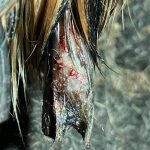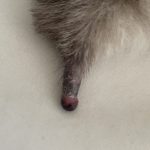Here are some photos and comparative x rays of how quick it got to Megacolon
Rottweiler, female, 11 years old.
Vertically split nail; under vet care but I think we need to get more decisive.
The vet trimmed the nail half way with local (dog has bad reaction to sedation protocol, narcotics, etc). Still hurt and vet said it would cause undue pain. However, the nail continues on splitting.
How common of a procedure is cutting the nail off all the way to nail bed? How does that improve outcome? How much faster is the recovery?
By what percentage is anesthesia risk lower with such a short procedure? (Has to be anesthesia as explained above). Last time, after anesthetic procedure, she had heart rhythm problems and other problems; became critical and almost died. But was also full of drugs and had pancreatitis as complication of splenectomy. I’d assume the shorter the time under, the lower risk of complications?
I’m concerned about putting her under but I’m also concerned about dragging this out for weeks, taking valuable time from her, and having to do it that way anyway eventually.
I really don’t know what is the best thing to do for her. Hubby leaning toward waiting if it heals but I’m not seeing it healing any time soon if at all. (Photo of the present state of the nail attached.
I’m sad, depressed, concerned, and don’t know what I should decide for her.
Comments
I am trying to reach out to Dr. Magnifico. I have a 10 Month old cat that started to puke and it was unusual for him so I paid closer attention and realized he was going to the litter ofter and straining at first I thought maybe he had a blockage with the puking then after taking him to the vet on 3/31 and after x-rays they determined that he was constipated but at that time didi not have mega colon they had me try Laxatone and probiotics he was still having bowel movements daily so I was was still concerned as he was in the litter often straining though and Then on 4/3 I took him to a different animal hospital because they were walk in and i could be there before i could get ahold of his original vet and I Didn’t think I could afford an ER visit but that appointment cost me over $800 for blood work and X-rays and they gave him Anastasia and manually cleaned him out. at that point I was calling his original vet he he regularly see and originally saw for this problem because the vet that did the procedure just gave me prescription dry food and sent me on my way so I wanted to make sure it was the right action plan to get him back to normal. My original vet never called me back until I called to ask for his records thats when they decided to get him back in. So on 4/8 He started vomiting again and his original vet saw him and said he needed fluids but his stool seemed soft and like it should pass. they gave me pain meds for him fpr 3 days and metocopramide for 4 days. along with a different prescription wet food and Hydracare. Then I noticed on mu bill i was charges for Lactulose which they didn’t tell me wasn’t in stock and i would have to wait to get but it was weekend and they closed so per a megacolon group i am in i gave him 1/8tsp of mirilax a day he still has had at least 1 goof bowel movement a day but the problem I am having is that he is in the litter box straining constantly to the point of falling over and his back side is so swollen and raw! I called the vet numerous times to just ask for guidance and am not getting anywhere I have spent over $1600 which I definitely do not have and I would think by now I would have some answers. All I want is for him to not be in pain. I don’t know if there is anything I can do for his swollen raw bottom. It feels like its never going to end there is constantly poop on his bottom on-top of it I am trying to keep it clean for him but It is so painful for him for me to clean. I guess I just want to know if this will stop or will he be constantly trying to stain and go? They said that his colon can go back down in size since it just happened and he is so you but I just feel so defeated right now!
Comments
live in the Pittsburgh pa area. I have a cat with the nasal polyp issue. …
I live in the Pittsburgh pa area. I have a cat with the nasal polyp issue. He’s 5 yr old. I don’t have $2400 for the surgery at the specialist I was referred to. If you could point me in a direction. He keeps getting cold symptoms every few months. Can they suffocate? I know they don’t breathe out of their mouth. I’m so worried.
Comments
My 2 year old female dog was neutered last week and the incision site is looking concerning. The only veterinary clinic close to us is closed today and I am worried about infection or other issues. The dog is an obssesive licker and I don’t know if the wound is healing ok.
Comments
I live in the Pittsburgh pa area. I have a cat with the nasal polyp issue. He’s 5 yr old. I don’t have $2400 for the surgery at the specialist I was referred to. If you could point me in a direction. He keeps getting cold symptoms every few months. Can they suffocate? I know they don’t breathe out of their mouth. I’m so worried.
Hey everyone. My sweet baby girl Ellie May is 11 going on 12 and has IVDD with back leg paralysis. The funny thing is that overtime she has been able to sometimes memory walk which resembles a raccoon on our carpet and can even kick her back feet when you carry her. She’s unable to urinate on her own so I do that for her and have for years. She has a wheelchair, her own playpen and even her own stroller because she is my diva child.
Last weekend little miss decided to jump from her stroller because she was too impatient to see what I was cooking in the kitchen. She didn’t help or anything and has even done this before and it doesn’t phase her but about gives me a stroke. Last Sunday morning I was getting her out of bed and she yelped and when I gently sat her on the floor to get her morning drink before tinkle time she flopped out on her left side. Since then she has weakness In the front and she knuckles the foot but can still put pressure but is hard to get around and will cry in pain and breathes heavier. She’s a dachshund so we all know their attitude and behaviors.
I called my veterinarian and it has been a back and forth battle the ENTIRE week and I haven’t actually spoken to the vet just desk people who apparently don’t like to pass messages or do anything really. I totally understand how busy a farm vet practice is but some communication would be nice. Thankfully I had some gabapentin left from her sister Miley’s dental and have been doing that twice a day but the dose is in half as she weighs less than Miley. When they did call me back they said yes what I was doing was fine as I’m also doing crate rest. I’ve done this dance before with my girl so we know what to do. From the start she wasn’t a candidate for surgery they said since she had already lost function In her legs. But with my love and care she bounced back within 2 weeks and then slipped again a few weeks later and has been without full use since.
I expressed my concern she could have slipped a front, they don’t seem all too worried,really????? Now my hubby and I have a game plan that as long as Ellie has the will to fight and live then so do we but the second she is truly suffering we will not allow her to deal with that. I’ve had so many folks wonder why we have a special girl and didn’t just put her down, I respond with would you shoot your own child if he broke his leg and couldn’t play sports again? You don’t give up on your dogs. If anything she has more attitude being my handy girl. We call her the sheriff of tiny town. I called my vet yet again yesterday to try and get in for a steroid injection and some nsaids and they just don’t seem to pass the message. So tomorrow I’m calling as their hours are 8a-12pm and if they can’t get me in then praying that at least doc can call the meds in for her. As a mama of an IVDD baby I’m familiar with the drill. Thank you for letting me vent.
We are ordering a secondary pop up playpen for her for when we are upstairs and when we are downstairs . Also ordering a raised bowl set so she isn’t angling her head down, I’ve rolled up blankets into the open areas in her playhouse so she is more secure and comfortable. Are there any other IVDD parents out there? Any and all tips would be greatly appreciated
Comments
My 9 year old Potcake (probably shepherd/lab/etc mix) has a long history of lipomas, which grow fairly large. In late October of 2022 I found a lemon sized mass on the back of his right hind leg, which was not bothering him but was firm. Our vet in Ottawa ON is a VCA practice nearby; I was able to get an appointment the next day. The vet and I were both concerned at the location, size and consistency of the mass.
She recommended an xray of the limb and a chest xray to rule out cancer and metastasis as well as blood work. (all normal) She sedated him for the radiorgraphs and aspirated the mass multiple times with a presumptive diagnosis of lipoma. We discussed the fact that it was probably and inter-muscular lipoma, between the two muscles of the hind leg at the back . To remove it she advised a board certified surgeon elsewhere, who she said would want to do an MRI of the limb first to evaluate the extent of the mass in preparation for surgery. When I expressed concern about the cost she offered a surgeon at the VCA who is not board certified but who may be able to attempt a surgery without the MRI.
Since October the mass has grown, especially medially, and is now the size of a grapefruit. He is still not lame or uncomfortable when I feel the mass. I want to prevent problems for him with this leg but I also worry about the invasiveness of the surgery – and the cost, which I can’t afford right now. I am waiting and watching at this time. I worry about having the mass return even after surgery and wonder about removing the majority of it just to give him more comfort when moving – is it ok to wait until it gets bigger? I know that lipomas don’t tend to spread to other parts of the body like malignant cancer – this is why we took the xrays, to look for other signs of cancer in his body. Now i wonder if this was too soon, and should have waited on those tests.
Comments
Hi everyone,
It’s my first time to have a pet her name is Kumiko i got her when she was only 3month now she’s already 6months. When i got her her fur parents didn’t told me initially that her mother got her tail degloved. She was born inverted butt first so her mom accidentally degloved her tail. I have been treating her since then. Her tail will dry up and will last for 4-7days then the skin sheds and bleeds. She’s been wearing Elizabeth collar since then. I am getting desperate already. I consulted a Vet and now they are suggesting to have it amputated. There is no current infection but it doest heal properly. Hope someone can help me. I still don’t want her to get amputated.
Comments
Hi Krista! I have a 9 year old beagle who periodically (at least twice a month) will vomit all day. He vomits his morning food, then continues to vomit mucus and bile the remainder of the day. His vet has done a physical exam and blood work, and he kept him overnight once to give him IV fluids and anti nausea meds. He always bounces back within 12 hours, but this is getting to be really tiresome. His weight and energy levels are fine after this passes. And his stools look normal. Do you have any suggestions? I will share a picture of the last vomit from a couple of hours ago – this was about the 8th time he puked today. It went from food to mucus to this. I don’t feed him at all when he’s like this. As of right now, he’s perfectly fine and begging for food!
One additional note… we give him Purina One (vet’s suggestion) and use a slow feeder. We feed him small meals 4x/day, rather than 2 big meals. We are also very careful about making sure he doesn’t eat anything he shouldn’t.
Thank you!!
Comments
Hi Krysta,
Just recently saw one of your videos regarding IVDD our soon to be 6 yr old Chocolate Lab Bruschi was recently diagnosed with this condition. We don’t know what to do surgery seems out of the question financially. What are some physical therapy practices we can do to help him? Please advice


















Hello,
First I will admit that I have had cases like this and they are frustrating. So I remind my clients this.
Next we take it in small steps. I do start with trimming the nail as much as able and start toe/foot soaks to keep the area clean and place an ecollar to stop the patient from licking and further traumatizing the nail and seeding infection from the mouth . I ask them to give it a week or two to heal.
If it doesn’t or other nails start cracking we talk about oncodystrophy. And start talking about what to do if that is the case. The treatment options are not great so the decision to treat needs to be made with a great deal of thought or referral to dermatologist is recommended.
In one case I had a dog who was placed under general anesthesia and the nail was ground to the base to allow a new nail to grow back.
Risk of anesthesia is something discussed on a case by case basis and usually has little definitive concrete information to allow predictive measures or reasoning. That would be a conversation for an anesthesiologist.
Also I have had some cases with underlying nail bed infections so antibiotic’s, foot wrap and medication or culture and sensitivity testing might be helpful.
It’s already been three weeks now. It appears the nail was vertically cracked from the beginning with the first part in the middle (which is now the end)
How well did the grinding to the nail bed work and what was the recovery?
The other nails appear to be fine.
Grinding the nail was a last resort for a difficult chronic case. It worked but it was a last resort treatment.
Actually, it looked quite bad and hurt every time she brushed it on something. We had the nail entirely removed last Friday. Anesthesia was a risk, but I didn’t want her to spend whatever time she has left trying to get that damn nail healed–she already lost months with the first one.
The upside–48 hours of bandage, some pain meds, and all done. It looks good now and doesn’t bother her at all. She can now get on with her life and have fun.
I hated taking the risk but I”m glad I did.